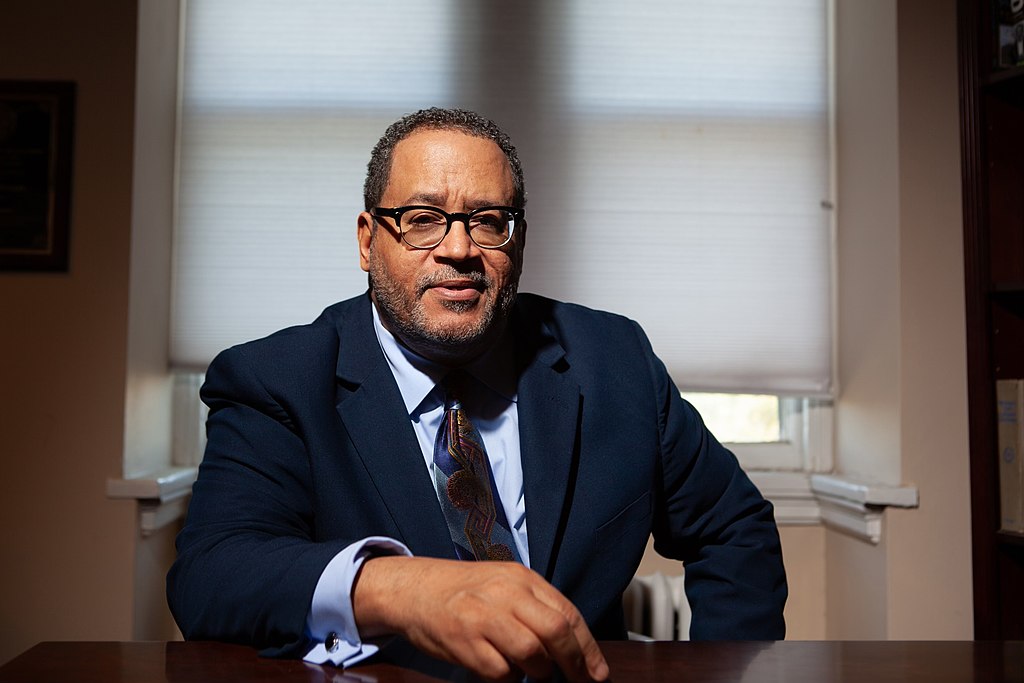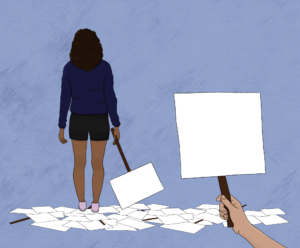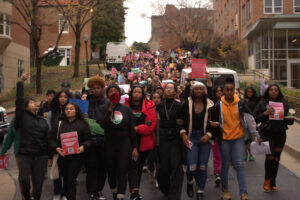Georgetown conducted an investigation into Professor Michael Eric Dyson beginning in February 2020 for allegations of harassment and repeated attempts to establish an off-campus relationship with a female student in one of his Georgetown classes, according to the student and emails obtained by the Voice.
Georgetown’s Institutional Diversity, Equity and Affirmative Action (IDEAA) office began a formal investigation into Dyson’s conduct after the student and members of the Black Survivors’ Coalition (BSC) raised instances of harassment and inappropriate interactions with students. Allegations against Dyson, one of the country’s foremost Black scholars, go back to the 2000s, but this action triggered the first known formal inquiry into Dyson’s behavior. The Georgetown investigation, which included interviews with BSC members and the student, extended through the summer of 2020.
On Sept. 28, Vanderbilt University announced its appointment of Dyson, who served as a tenured sociology professor at Georgetown between 2007 and 2020, as the Centennial Chair and University Distinguished Professor of African American and Diaspora Studies, effective Jan. 1, 2021. The Voice is unable to confirm if Dyson’s move to Vanderbilt was related to the IDEAA investigation. Dyson did not respond to multiple requests for comment on this matter.
In an interview with the Voice, the student, who will remain anonymous, disclosed details of Dyson’s harassment while she was enrolled in one of his classes at Georgetown in the fall of 2019. According to the student, sixty-two-year-old Dyson attempted to use his status and connections to establish a relationship outside of the classroom. The student alleged repeated private dinner invitations off campus, personal text messages, and incidents of unwanted physical touch and proximity—including invasions of personal space and an instance of Dyson massaging the student in class. When she offered to meet Dyson during office hours instead, according to the student, he insisted on private conversations outside an academic setting.
The IDEAA investigation into Dyson began after student advocates raised concerns about his behavior in a conversation with University President John DeGioia and Vice President for Institutional Diversity and Equity Rosemary Kilkenny during the BSC sit-in in front of DeGioia’s office from Feb. 24 to 28 last year. During the week-long protest, students called for improved resources for Black survivors of sexual assault and harassment. A video recording from the sit-in obtained by the Voice shows a member of the BSC naming Dyson as an individual who posed a threat to Black women and femme students on campus.
According to the anonymous student and Joey Brown (COL ’22), a member of the BSC, the conversation with administrators during the sit-in prompted Kilkenny to begin an investigation into Dyson in her role as IDEAA liaison. The Georgetown investigation concluded in mid-September of 2020, but according to the student and BSC members, its results were not made public, as is consistent with IDEAA policy. The university did not confirm the end of the investigation or release results in response to a Voice inquiry.
An email acquired by the Voice from March 14, 2020 confirmed that Kilkenny and Tonya Turner, associate director of IDEAA, met with BSC members following the sit-in to discuss allegations against Dyson on March 6. Dyson is specifically named in the email.
The student added that she met with Kilkenny around this time and recounted the incidents of harassment and inappropriate behavior by Dyson.
A May 26 email obtained by the Voice from Kilkenny to the student confirmed that an official investigation had begun, with two members of the IDEAA office looking into student accounts of Dyson’s behavior. Under IDEAA confidentiality procedures, Dyson was not mentioned by name in that email, but previous messages in the same chain mentioned him explicitly in connection with meetings about incidents of harassment toward the student.
On May 27, the student received an email from Title IX and civil rights investigator Sarah Onori to schedule a meeting with Onori and Bisi Okubadejo, associate vice president of IDEAA, to discuss relevant information to the investigation, according to an additional email obtained by the Voice.
The Georgetown student is not the first individual to bring forward allegations against Dyson. Crystal Fleming, a professor at Stony Brook University who helped organize a conference with Dyson while in graduate school, has also made public allegations against Dyson for similar harassing behaviors while he was a professor at the University of Pennsylvania. (Editor’s Note: Fleming and Dyson did not collaborate on the conference; Fleming organized a conference as a graduate student for which Dyson was asked to speak, which is what spurred their interaction).
Fleming initially shared her experiences in a 2017 Twitter thread about an unnamed professor at the height of the #MeToo movement. Of the professor’s influence and harassment, she wrote, “It was such a confusing mix of emotions for a naive 20-something grad student: initially flattery from garnering the interest of a ‘star’ combined with disappointment and disgust at realizing I was being sexually objectified, rather than treated as an intellectual peer.”
After BSC brought additional allegations against Dyson to light, Fleming identified Dyson as her harasser in a March 19, 2021 tweet: “Now that the whisper network has gone public, let me add my voice: I was one of the students Michael Eric Dyson harassed.”
In an email to the Voice, Fleming clarified the timeline of Dyson’s behavior against her as a graduate student. “I think it’s important to contextualize what I shared with the fact that Dyson was not my professor when the incident took place. I was a graduate student at Harvard and I believe he was then a professor at UPenn,” Fleming wrote. “Although he was not my professor, his conduct was still appalling and had a negative impact on me as a young scholar.” Dyson taught at the University of Pennsylvania from 2002 to 2007.
“I would only add that I am proud of the courageous students who have expressed concerns about Professor Dyson,” Fleming wrote.
Georgetown did not respond to specific questions about the 2020 Dyson investigation, referring only to the investigation process for allegations of harassment by professors. “While we can’t comment on any individual cases, Georgetown has robust processes in place for responding to allegations of sexual assault and misconduct, including options for filing a formal complaint,” a Georgetown University spokesperson wrote in an email to the Voice in response to questions about the allegations against Dyson. “When a formal complaint is filed with the University, we investigate the allegations thoroughly.”
The university conducts IDEAA investigations to review alleged violations of the university’s policies regarding equal opportunity and non-discrimination in employment and education, affirmative action, harassment, and sexual misconduct.
Georgetown University defines harassment as verbal or physical conduct that results in an intimidating, hostile, or offensive educational or work environment, or negatively affects an individual’s work or educational opportunities. “Harassment is especially serious when it occurs between teachers and students or supervisors and subordinates. In such situations, harassment unfairly exploits the power inherent in a faculty member’s or supervisor’s position,” the university policy statement on harassment reads.
According to university course catalogues and confirmed by a university spokesperson, Dyson has also not taught classes at Georgetown since the fall of 2019. The Voice cannot confirm if this pause in teaching was related to the IDEAA investigation.
Before Georgetown, Dyson taught at Chicago Theological Seminary, Brown University, the University of North Carolina at Chapel Hill, Columbia University, DePaul University, and the University of Pennsylvania. In his time in academia, Dyson has become a prominent and frequently-published voice on race, politics, hip hop, and justice. Dyson is a contributing opinion writer at The New York Times, and has worked as a contributing editor at The New Republic and ESPN’s Undefeated. He is a commentator on National Public Radio, MSNBC, CNN, and is a recurring guest on Real Time with Bill Maher.
An ordained Baptist minister, Dyson is also the author of numerous books that have received NAACP Image Awards and an American Book Award. Dyson was previously considered for employment at Vanderbilt in 1999, but was not offered a position, instead accepting a teaching role at DePaul University. At the time, Dyson’s rejection from the Directorship of African American Studies as a Black man received public outrage from Vanderbilt professors, who had unanimously recommended him for the position.
According to a Vanderbilt University spokesperson, there is no Vanderbilt investigation into Dyson at this time. “Consistent with our values, when conducting these reviews, we also work to maintain fairness and protect the rights of all involved. We have carefully reviewed the available facts related to this matter,” the university spokesperson wrote in an email to the Voice. “We’re not aware of any previous Title IX investigation involving Professor Dyson.”
A potential Vanderbilt investigation would fall under their Equal Opportunity and Access Office or Title IX. Vanderbilt did not confirm knowledge of any other investigations into Dyson. “The information we have at this time does not warrant any further action by the University,” the spokesperson wrote.
The Vanderbilt course catalogue is not released until later in the summer, and the Voice is currently unable to confirm whether Dyson will be teaching classes in the fall.





